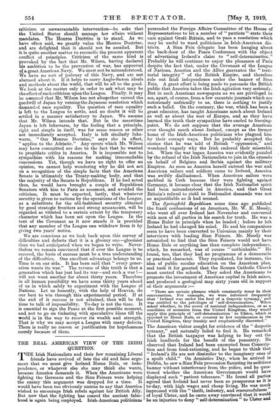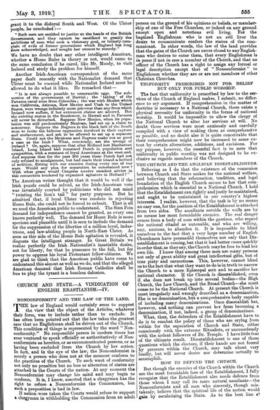THE REAL AMERICAN VIEW OF THE IRISH -QUESTION.
THE Irish Nationalists and their few remaining Liberal friends have revived of late the old and false argu- ment that we must give Ireland Home Rule, or inde- pendence, or whatever else she may think she wants, because America demands it. When the Americans were fighting the Germans and the Sinn Feiners were helping the enemy this argument was dropped for a time. It would have been too obviously untrue to say that America wished to encourage Irish rebels against her British Ally. But now that the fighting has ceased the ancient false- hood is again being employed. Irish-American politicians
persuaded the Foreign Affairs 'Committee of the House of Representatives to -let a number of " patriots state 'their case against Gretit Britain, and to pass. a resolution-which may be useful to ward.politicians in Irish-American dis- tricts. A Sinn Fein delegate has been hanging about the back-door of • the Peace Conference with the object of advertising Ireland's claim to " self-determination." Probably he will continue to enjoy the pleasures of Paris despite the fact that, under the Covenant of the League of Nations, America and the Allies guarantee the " terri- torial integrity " of the British Empire, and therefore mile out Irish independence under the banner of Simi Fein. A great effort is being made to persuade the British public that America: takes the Irish agitation very. seriously. But in such American newspapers as we are privileged to see,apart, of course, foams few eccentric intimate which are notoriously unfriendly to us, there is nothing to justify such a belief. On the contrary, the war, which has been a great educator, has taught Americans muckabout Ireland as well as about the rest of Europe, and as they have learned the truth their sympathies have cooled to freezing- point. We do not suppose that the average American ever thought much -about :Ireland, except as the former home of the Irish-American--politicians who plagued him by their corrupt ways. But he probably accepted the stories that he was told of British " oppression," and wondered vaguely why the Irish endured their miserable lot. When the war began America was evidently puzzled by the refusal of the.lrish Nationaliatsto join in the crusade on behalf of Belgium and Serbia against--the military Empires. As soon as America herself entered the war. and American sailors and soldiers came to Ireland, America was swiftly disillusioned. When American • sailors were mobbed in Cork because they were fighting • against Germany, it became clear that the Irish Nationalist spirit had been misunderstood in America, and that Great Britain's refusal to yield to Nationalist demands was not so unjustifiable as it had seemed.
The Springfield Republican some time ago published the frank confessions of an American, Mr. W. R.. Moody, who went all over Ireland last November and conversed with men of all parties in his search for truth. He was a Home Ruler in principle when he landed ; .before he left Ireland he had changed his mind. He and his companions seem to have been converted to Unionism mainly by their interviews with leading Sinn Feiners. Mr. Moody was astonished. to find. that the Slim Feiners would not have Home Rule or anything less than complete independence, which, he remarked, was of course " unthinkable." He found, too, that they had no programme of. a democratic or practical character. They repudiated, for instance, the idea of public -secular education on the American plan, and took it for ,granted that the Roman Catholic Church must control the schools. They asked the Americans to promote the investment of American capital in Irish mines, and produced a .geological map sixty years old in support of: their arguments ;—
" There are certain phrases which constantly recur in their conversation. For example, we were informed frequently that ' Ireland was under the heel of a despotic tyranny,' and was entitled to the privileges of self-determination.' When asked whether, in the event of national independence, or as a condition of secession from the United Kingdom, they would apply this principle of ` self-determination ' to Ulster, which is opposed to Rome Rule, or consent to her continuance, in the United. Kingdom, they frankly and emphatically dissented."
The American visitor sought for evidence of the " despotic tyranny," and naturally failed to find it. He remarked that the British taxpayer was helping to buy out the Irish landlords for the benefit of the peasantry. He observed. that Ireland had been exempted from Conscrip- tion and. from food-rationing, and he began to think that " Ireland's ills are not diaaimilar to the imaginary ones of a spoilt child." On Armistice 'Day, when he arrived in Dublin, he saw a Sinn. Fein procession flaunting its seditious banner without interference• from the- police, and he ques- tioned whether the American Government would have displayed such "patient tolerance." He found all parties agreed that Ireland had never been so prosperous as it is to-day, with- high wages, and cheap living. He was much impressed with the ". thrift, industry, and resourcefulness of loyal Ulster, .and he came away convinced that it would be an injustice to deny " self-determination " to Ulster and
grant it -to the disloyal South and West: Of the. Ulster people, he concluded :— " Such men are entitled to justice at the, hands of the British Government, and they cannot be- sacrificed to gratify the ambitions of men -who seek a visionary goal, or bitterly corn. plain of evils of former generations which England has long strum acknowledged, and 'sought her- utmost to remedy."
We have no doubt that any other intelligent American, whether a Home Ruler in theory or not, would come to the same conclusion if he cared, like Mt. Moody, to visit Ireland and study the problem for himself.
Another Irish-American correspondent of the same paper dealt recently with the Nationalist demand that Ulster must be coerced while Nationalist Ireland must be allowed to do what it likes. He remarked that-
" It is not- always possible- to unscramble eggs. The sub. version of the government of Hawaii ; the ' taking ' of the Panama canal zone from Colombia ; the war with Mexico which won California, Arizona, New Mexico and Utah to the- United States, were wrongs infinitely mom grievous than any from which Ireland now suffers, if her extremest claims are allowed. But the existing status in the Southwest, in Hawaii and in Panama will never be disturbed. Suppose New Mexico, when its popu- lation was still .predominately Mexican, had set up a claim to autonomy. Suppose the Negroes in the black belt of the South were to recite the hideous oppression involved in their capture and enslavement, and ask to be allowed to set up a separate State. Could not the Mexicans and Negroes make out as good a case as the Irish ? What, concretely, are the wrongs- of Ireland ? Or, again, suppose that after Holland lost Manhattan Island, Long Island had remained Dutch in population and sympathies, with a remnant of loyal Americana at the west end. And suppose that for the past 300 years these Dutch had not only refused to amalgamate, but had made their island a hotbed of sedition, flirting with our enemies during every one of our ware. Would any plea for separation be entertained now ? With what grace would Congress receive unasked advice in this connection tendered by organized agitators in Holland?"
The American writer thought that it would be well if the Irish puzzle could be solved, as the Irish-American vote was invariably courted by politicians who did not mind " twisting the lion's tail .' for party purposes. But he admitted that, if loyal. Ulster was resolute in rejecting Home Rule, she could not be-forced to submit. That is all we need the American. public to understand. The Sinn Fein demand for independence cannot be granted, as every one knows perfectly welt The demand for Home Rule ismore specious and plausible until it is seen to include the demand for the suppression of the liberties of a million loyal, indus- trious, and law-abiding people in North-East Ulster. As soon as this side. of the Home Rule agitation is revealed, it disgusts the intelligent stranger. In Great Britain we realize perfectly the Irish. Nationalist's insatiable desire, not for liberty, for- that he possesses. to the full, but for. power-to oppress- his loyal Protestant fellow-citizens. We are glad to think that- the American public have come to understand this almost-as well as.we do, and that the.alleged. American demand. that Irish- Roman Catholics shall be free to play., the tyrant is- a baseless delusion.



































 Previous page
Previous page